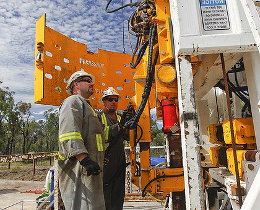Push to teach builders to drill as boom-times change
 Workers who have been building new mines should now be taught to operate them, an oil and gas industry report says.
Workers who have been building new mines should now be taught to operate them, an oil and gas industry report says.
The Australian Workforce and Productivity Agency (AWPA) have released their Resources Sector Skills Needs 2013 paper. In the report, it finds that thousands of jobs will soon be available in oil and gas as massive shale and coal seam projects get underway. At the same time, the end of the investment cycle of the mining boom means that not nearly as many new sites will be built.
This finding has led AWPA to suggest that the resources industry should work with governments and education providers to create a national project aimed at re-skilling workers to move from building mines to operating them.
The new style of extracting oil and gas is a particularly specialised form of resource production. If the thousands of upcoming positions cannot be met by an adequately trained workforce, AWPA says foreign workers with the right skills will have to be brought in for supervisory and managing roles.
“There is substantial growth in operations workforce both in mining and oil and gas,” says AWPA board member Keith Spence.
“Our fear is that without some coordinated effort we won't step up to the mark as well as we could.”
“There are some fantastic examples of programs that individual companies are running. But what it needs is a more co-ordinated approach.”
Recent statistics have shown the start of the gear-change in the sector.
The number of jobs in resource construction is expected to fall from around 83,324 in 2014 to just 7,708 in 2018.
Meanwhile, jobs in mining production are set to shoot up from 236,690 workers in 2013 to 254,260 in 2018, as the export of resource takes off.
The total amount of workers in oil and gas is predicted to leap from 39,000 workers in 2013 to 61,212 in 2018.
Projects such as the UK's Oil and Gas Upstream Technician Training Scheme and Western Australia's energy apprenticeship scheme should be expanded across Australia to address the growing shortage of drillers, mining engineers, and chemical, gas, petroleum and power generation plant operators – the report found.
Higher-order skills in science, technology, engineering and maths should be pushed too, including post-graduate training around industrial automation – as technology is increasingly being employed to save money and risks.







 Print
Print